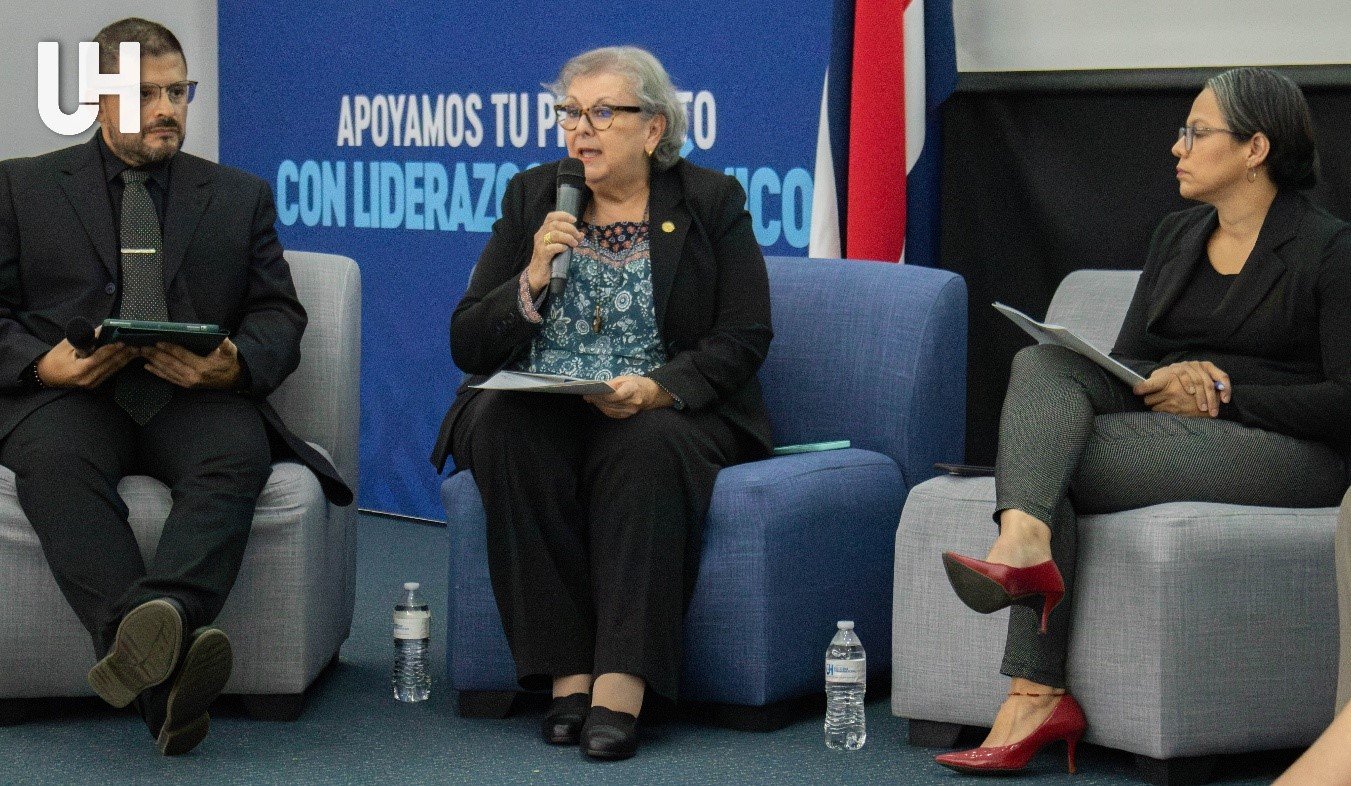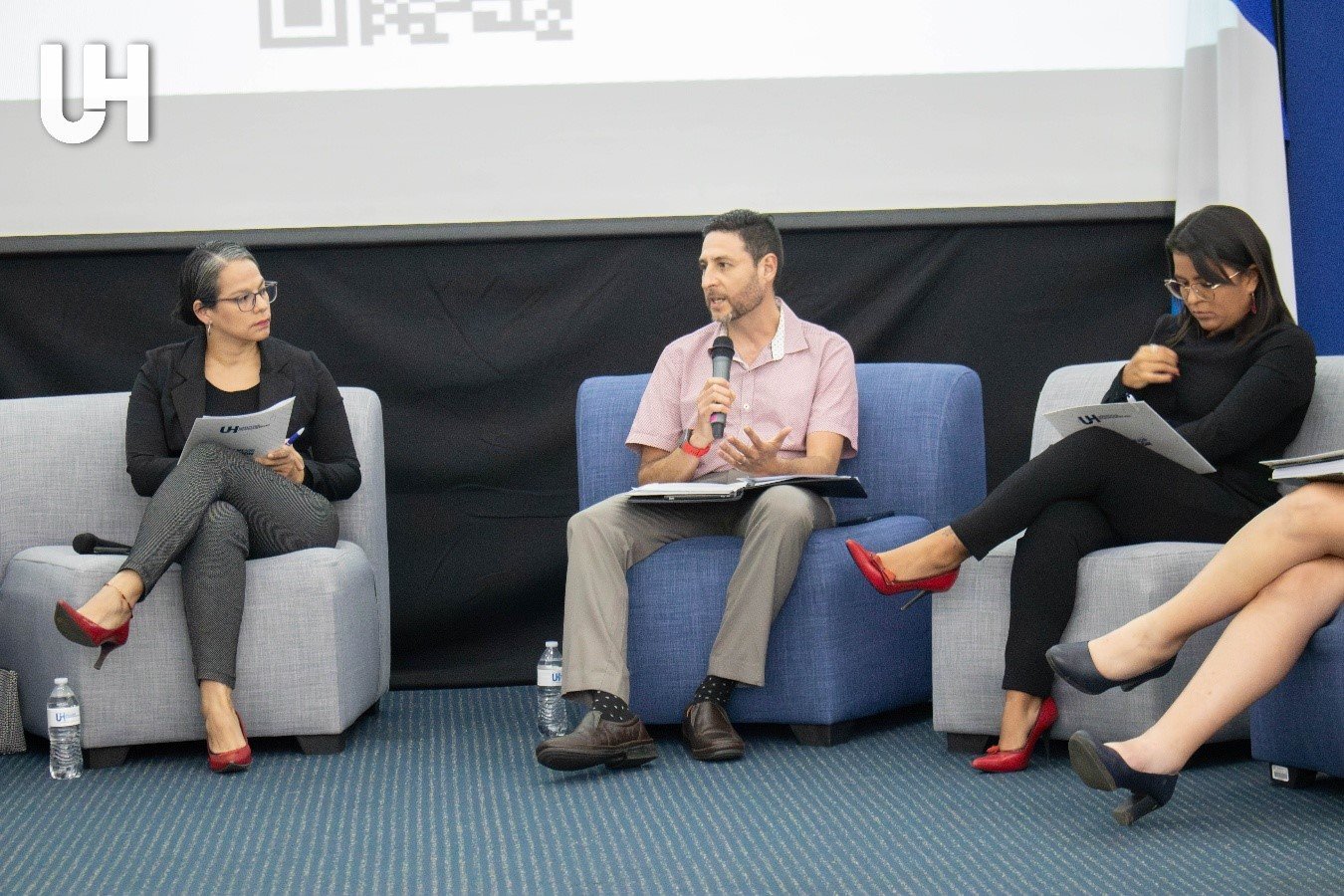Students and professors from the Universidad Hispanoamericana in Costa Rica had the opportunity to hear five experts discuss key topics on mental health and childhood obesity prevention.
Costa Rica has the highest rate of childhood obesity in Central America, and reversing this trend will require the joint work of health and education professionals. For this reason, the Universidad Hispanoamericana (UH) is participating in the Erasmus+ CIELO project, which seeks to contribute to capacity building in professionals who work with children and their families. As part of this initiative, a roundtable discussion was organized with experts in psychology, medicine, nursing, education, and nutrition, who shared their experiences and perspectives on children’s health in Costa Rica.
The roundtable, titled Comprehensive Approach to Childhood Obesity and Mental Health: Impact in Latin America, began with an introduction by Dr. Joshua Santana Segura, a collaborator in the CIELO project at UH. He explained the project’s significance and scope to attendees (students and professors).
CIELO is co-funded by the Erasmus+ program and executed by a team of 12 Higher Education Institutions from Latvia, Poland, Finland, Mexico, Chile, and Costa Rica. The project aims to create an innovative curriculum to enable students, faculty, and health professionals in Chile, Costa Rica, and Mexico to develop skills for preventing childhood obesity and promoting mental health.
The roundtable featured:
Dr. Julia Fernández Monge (Medicine)
Dr. María del Mar Montero Aguilar (Nursing)
Dr. Antonio Fernández Ureña (Nutrition)
Dr. Marjorie Moreno Salas (Psychology)
MEd. Yendri Murillo Zúñiga (Education).
During the event, speakers addressed questions from their areas of expertise about children’s mental health and obesity.
Key points from the discussion:
Mental health challenges: Dr. Marjorie Moreno Salas highlighted the alarming increase in anxiety, depression, suicidal ideation, and self-harm among children and adolescents in Costa Rica. She emphasized the need for family-centered care and recommended motivational interviewing as a tool to reduce resistance to change.
Family influence on childhood obesity: Dr. Moreno pointed out that children adopt the lifestyles of the adults around them. She stressed the importance of considering family dynamics, especially in contexts where affection is expressed through food, such as offering sweets or ultra-processed snacks as a way to show love.
Obesity statistics and lifestyle changes: Dr. Julia Fernández Monge noted that lifestyle changes have contributed to the current childhood obesity pandemic. She cited data from the 2016 school census, which showed that 34% of schoolchildren in Costa Rica were overweight or obese. She posed the question of how the pandemic might have affected this issue and emphasized the importance of healthy role models within families: children who eat healthy diets are those who have role models in their family nucleus, that is, parents and guardians who also eat healthy diets.
Sedentary lifestyles and social norms: Dr. Antonio Fernández discussed the role of sedentary lifestyles and excessive calorie consumption in childhood obesity. He pointed out how societal norms, such as the normalization of unhealthy behaviors like offering sugary treats at celebrations, contribute to the problem: He highlighted that it is common for parents to normalize their children’s excess weight, which fosters unhealthy behaviors widely accepted by society. As an example, he pointed out the normalization of offering “empty calories” during children’s celebrations. Examples include birthday cakes, ice cream, and candies, which are regularly given to children as a way to celebrate them.
The mental health-obesity cycle: Dr. María del Mar Montero explained the vicious cycle between mental health disorders and obesity, where anxiety and depression lead to sedentary behavior, which in turn promotes weight gain, further exacerbating mental health issues.
Educational initiatives in nutrition: MEd. Yendri Murillo Zúñiga called for schools to prioritize nutrition education for both students and parents. She emphasized the role of educators in modeling healthy eating habits for children.
Additional discussion topics
Other topics that were discussed were:
- The need for better governance, including more healthcare professionals in the public sector for timely access to services.
- Advocacy for clearer labeling on ultra-processed foods to make nutritional information accessible to the general public.
- The impact of genetically modified fruits, which now contain more sugar and less fiber, highlighting the importance of awareness about nutritional needs.
- The elimination of stigma, which can prevent individuals from seeking timely help for obesity or mental health issues. Open and judgment-free discussions were emphasized as essential to reducing stigma.






















